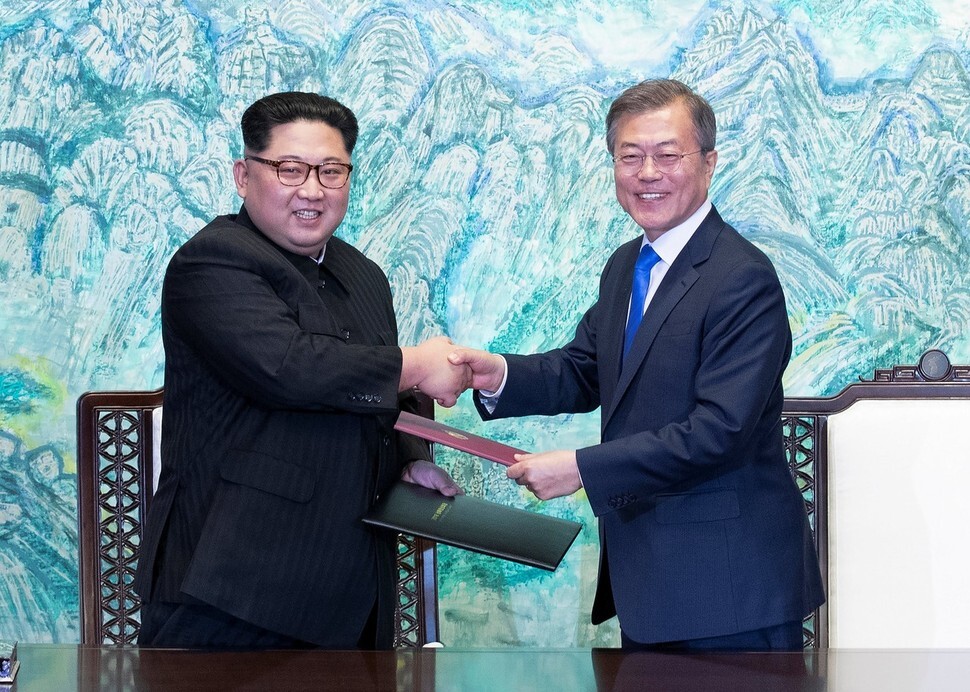hankyoreh
Links to other country sites 다른 나라 사이트 링크
[Column] The COVID-19 pandemic makes inter-Korean cooperation even more urgent

“The very sight of those run-down South Korean facilities puts me in a bad mood. Get them out of here!” Those were the instructions given by North Korean leader Kim Jong-un when he visited the tourist resort at Mt. Kumgang in October 2019. Afterward, North Korea sent a request to the South Koreans to tear down all their facilities at the resort by February 2020. On Jan. 30, North Korea sent an update: facility demolition would be delayed to prevent the risk of coronavirus transmission.
When South Korea and the US carry out their joint military exercises in March and April of each year, North Korea responds harshly to what it regards as a rehearsal of an invasion of the North. Spring on the Korean Peninsula is plunged into a thick fog, both figuratively and literally, as military tensions combine with dust blowing in from the Gobi Desert. Since North Korea-US talks broke down in their summit in Hanoi in February 2019, Pyongyang has demanded that South Korea and the US halt their military exercises before the denuclearization talks resume. As it happens, the coronavirus outbreak has caused them to delay exercises scheduled for early March.
In short, the demolition of the Mt. Kumgang facilities and the South Korea-US joint military exercises — issues that were weighing down inter-Korean relations — have both been put on hold because of COVID-19. While fully acknowledging its tragic impact on human lives, the outbreak has also served to sweep away some negative factors affecting Korean Peninsula affairs in the first half of this year. Air quality around the world has improved as people limit movement and industrial activity; the virus has ironically given the earth life while taking away human lives.
Just like South Korea, the North has been focusing all its energy on combatting COVID-19. In its Jan. 29 edition, North Korea’s state-run newspaper the Rodong Sinmun reported that “the campaign to stop the spread of the novel coronavirus is a major political issue connected to the survival of the state.” North Korea shut down its borders completely. After delaying the beginning of the semester at all schools, the authorities recently have been allowing university students and students in their final year of high school to return to class. North Korea also canceled a celebration of the establishment of the Korean People’s Army on Army Day, on Feb. 8, and major international events in April, including the Spring Friendship Art Festival and the Pyongyang Marathon.
Some of the more notable outcomes of a meeting of the politburo of the Workers’ Party of Korea (WPK) and the third session of the 14th Supreme People’s Assembly, held on Apr. 11 and 12, respectively, were an emphasis on public safety, more money for the public health budget, and a greater focus on the construction of a general hospital in Pyongyang. North Korea is focusing on bolstering its “coronavirus leadership,” based on the belief that the outbreak can’t be defeated in the short term.
Back on Mar. 17, Kim Jong-un attended the ribbon-cutting ceremony for the Pyongyang hospital. During a speech delivered during the ceremony, Kim described the hospital construction project as “the most important and most meaningful task” in a year that marks the 75th anniversary of the establishment of the Workers’ Party of Korea (Oct. 10).
Not only North Korea but countries around the entire world regard COVID-19 as a critical threat to the survival of the state. The international community has defined infectious diseases and climate change as new security threats. In the traditional definition, security meant mustering forces inside national borders to counter military threats posed from outside the borders. Traditional security occupies a logical structure of conflict and confrontation.
Non-traditional threats transcend national borders, requiring international coordinationConversely, COVID-19 and modern security threats like climate change transcend national borders. Responding to these new threats requires countries to work together and is thus grounded in the logic of cooperation and symbiosis. During a commemorative address for the Mar. 1 Movement last month, South Korean President Moon Jae-in emphasized the need for South and North Korea to respond jointly to non-traditional security threats, such as infectious diseases, disasters on the borders, and climate change. When North Korea is struck by infectious disease or floods, after all, those disasters end up impacting the entire Korean Peninsula.
The international community regards South Korea as one of the countries that have responded most effectively to COVID-19. During phone calls with the leaders of 28 countries (through Apr. 22), Moon shared the country’s experience with and strategy for countering the disease. I’d like to see South Korea share its disease control model not only with foreign countries but also with our fellow Koreans in the north. Meeting in person might not be feasible because of the coronavirus, but a phone call would be. A hotline was set up between South Korea’s Blue House and North Korea’s State Affairs Commission on Apr. 20, 2018.
Two Koreans need to cooperate on protecting the Korean Peninsula from diseaseWe’re just a few days away from the second anniversary of the Panmunjom Declaration, which Moon and Kim signed on Apr. 27. The United Future Party holds that this declaration, as well as the Pyongyang Declaration, made in September of that year, represented South Korea’s effective disarmament. But during the three years since Moon became president, clashes between the South and North Korean forces have disappeared from the ground, air, and waters around the Korean Peninsula. While there have been ups and downs in inter-Korean relations during the two years since the Panmunjom Declaration, the basic vision of banishing war from the Korean Peninsula has been maintained.
I’d like to see the leaders of South and North Korea use that hotline to share their experience and knowledge, so as to protect Koreans in the south and the north from COVID-19 and to preserve their precious health. And unlike phone calls with foreign leaders, no interpreter would be needed for a phone call between Moon and Kim.

By Kwon Hyuk-chul, editorial writer
Please direct comments or questions to [english@hani.co.kr]

Editorial・opinion
![[Column] Life on our Trisolaris [Column] Life on our Trisolaris](https://flexible.img.hani.co.kr/flexible/normal/500/300/imgdb/original/2024/0505/4817148682278544.jpg) [Column] Life on our Trisolaris
[Column] Life on our Trisolaris![[Editorial] Penalties for airing allegations against Korea’s first lady endanger free press [Editorial] Penalties for airing allegations against Korea’s first lady endanger free press](https://flexible.img.hani.co.kr/flexible/normal/500/300/imgdb/original/2024/0502/1817146398095106.jpg) [Editorial] Penalties for airing allegations against Korea’s first lady endanger free press
[Editorial] Penalties for airing allegations against Korea’s first lady endanger free press- [Editorial] Yoon must halt procurement of SM-3 interceptor missiles
- [Guest essay] Maybe Korea’s rapid population decline is an opportunity, not a crisis
- [Column] Can Yoon steer diplomacy with Russia, China back on track?
- [Column] Season 2 of special prosecutor probe may be coming to Korea soon
- [Column] Park Geun-hye déjà vu in Yoon Suk-yeol
- [Editorial] New weight of N. Korea’s nuclear threats makes dialogue all the more urgent
- [Guest essay] The real reason Korea’s new right wants to dub Rhee a founding father
- [Column] ‘Choson’: Is it time we start referring to N. Korea in its own terms?
Most viewed articles
- 1New sex-ed guidelines forbid teaching about homosexuality
- 260% of young Koreans see no need to have kids after marriage
- 3Months and months of overdue wages are pushing migrant workers in Korea into debt
- 4Presidential office warns of veto in response to opposition passing special counsel probe act
- 5[Column] Life on our Trisolaris
- 6S. Korea discusses participation in defense development with AUKUS alliance
- 7OECD upgrades Korea’s growth forecast from 2.2% to 2.6%
- 8Hybe-Ador dispute shines light on pervasive issues behind K-pop’s tidy facade
- 9Japan says it’s not pressuring Naver to sell Line, but Korean insiders say otherwise
- 10Opposition calling for thorough investigation into Pres. Park’s unelected power broker